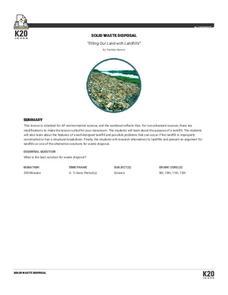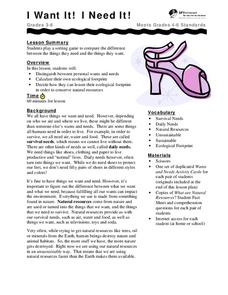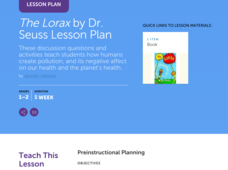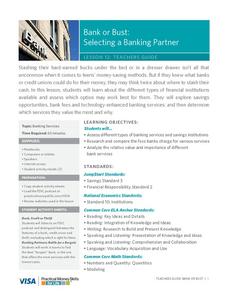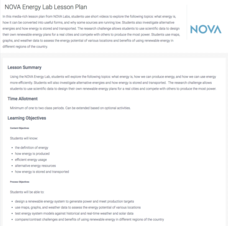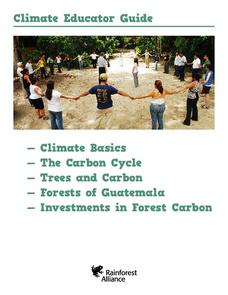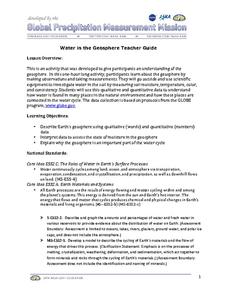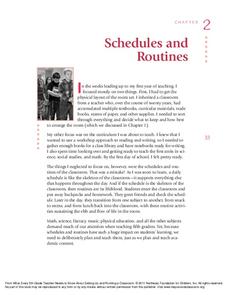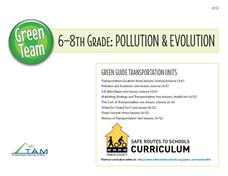American Museum of Natural History
Ask a Scientist About Our Environment
Let's ask an expert! Scientists at the American Museum of Natural History field questions about the environment in an interactive resource. Question topics range from global warming and conservation to endangered species and habitats.
American Museum of Natural History
Ask a Scientist About Our Environment
Scientists respond to 26 question posed by learners. These experts answer in easy to understand language, include photos to illustrate the issue, offer suggestions for how young people can make a difference, and supply links to resources...
Chicago Botanic Garden
Faces of Climate Change
Sometimes, the best solution to a problem can be found by walking in someone else's shoes. Here, scholars use character cards to take on the roles of people around the world. They determine how their character's life affects our...
K20 Learn
Filling Our Land with Landfills: Solid Waste Disposal
New ReviewThough it comprises only 5 percent of the world's population, the US generates 40 percent of the world's waste. Scholars learn about landfills, their safety, and other solid waste methods. They use experiments and research to learn more....
Nebraska Department of Education
Where I'm From
We are a tapestry woven of the threads of our family and its history, our environment, our ethnicity, and our culture. High school freshmen reflect on how these threads influence their goals for the future. After reading George Ella...
Practical Action
Climate Change - Who's In Control?
How can both individuals and governments respond to climate change and take responsibility to reduce its effects on our environment? Here you will find three lessons filled with discussion, debate, and role-playing...
Chicago Botanic Garden
Are You Bigfoot?
Scholars independently explore several websites to calculate their ecological footprint. Using their new found knowledge, they answer six short-answer questions and take part in a grand conversation with their peers about how our...
Maryland Department of Education
The Concept of Identity Lesson 2: The Historical/Biographical Approach
"How does our environment shape our identity?" After researching biographical information about John Knowles and considering how these experiences are reflected in A Separate Peace, class members consider the strengths and weaknesses of...
NOAA
Sustaining Our Ocean Resources
Lead young scientists on an investigation of fishery practices with the final installment of this four-part unit. Using a PowerPoint presentation and hands-on simulation, this lesson engages children in learning how fish populations are...
PBS
Technology: Conveniences and Consequences
It's a delicate balance—using technology to improve our lives while still protecting the environment, and ourselves, from the hazards of technology use. Class members examine statistics about the increase in media use, complete a survey...
City and County of San Francisco
I Want It! I Need It!
Discuss wants and needs with your elementary ecologists and get them to consider what would happen to our natural resources if we all got everything that we want. Learners play a card sorting game and take an ecological footprint quiz on...
Scholastic
The Lorax by Dr. Seuss Lesson Plan
Celebrate the whimsical world of Dr. Seuss with a lesson that features the memorable tale of The Lorax. After listening to a riveting read-aloud, scholars take part in a grand conversation about the story and environment. Then they...
Visa
Bank or Bust: Selecting a Banking Partner
Why shouldn't we just save all our money in our mattress? Couldn't our money disappear? Pupils discover the benefits of utilizing banks and credit unions for saving money, as well as how to evaluate different types of institutions by...
Polar Bears International
Taking Action!
Motivate young scientists to stand up and take action with this environmental science lesson. To begin, the class works in small groups brainstorming actions that support the conservation of the earth before creating and implementing an...
PBS
NOVA Energy Lab Lesson Plan
Can our energy resources keep up with our ever-growing population? Science scholars learn the basics of energy and Earth's energy resources during an electrifying lesson. The resource combines video clips and an engineering design...
Library of Congress
Investigating the Building Blocks of Our Community’s Past, Present, and Future
As Ken Jennings said, "There's just something hypnotic about maps." Certainly, the longer you look at them the more you can learn. In this project-based learning lesson, individuals study both historic and present-day maps of their area...
Rainforest Alliance
Who Takes Care of the Maya Forest Corridor?
Who keeps animals safe? Who keeps us safe? Discover the helpers that make learning and growing possible through a medley of activities that focus on habitats—ours and those in the rainforest. Scholars are asked to identify one helper who...
Baylor College
Water in Your Body
Do you know how much water you have had in the last 24 hours? Do you know how much your body needs? In this hands-on activity, your class members will estimate how much water our bodies lose each day by filling and emptying one-liter...
Northeast Foundation for Children, Inc.
Schedules and Routines: Grade 1
It doesn't matter if you're a new teacher trying to set up your classroom for the first time or a veteran teacher looking for new ideas to freshen up your teaching, this resource has something to offer everyone. After providing a general...
Rainforest Alliance
Climate Educator Guide
Climate change is a hot topic in the news. Class members examine carbon dioxide data to analyze trends of our atmospheric makeup over time. They also discuss climate and climate change, and determine how these changes are affecting life...
Curated OER
Water in the Geosphere
Through a PowerPoint presentation and the embedded animation and video, earth science enthusiasts find out about the moisture in the soil beneath our feet. In the animation, follow a water molecule on its path through the water cycle. As...
Northeast Foundation for Children, Inc.
Classroom Setup: Grade 3
There's a lot of thought that goes into setting up safe and supportive classroom environments. From establishing a whole group meeting area and arranging desks, to organizing classroom supplies and creating bulletin board displays, this...
Northeast Foundation for Children, Inc.
Schedules and Routines: Grade 5
Before diving head first into the year's curriculum, take time to establish clear routines and procedures for your classroom. Starting with how to set up a class schedule that meets the needs of fifth grade learners, this sample chapter...
Safe Routes to School
Pollution & Evolution
Bring together a study of two major scientific topics with a lesson on the relationship between pollution and evolution. With the help of a PowerPoint presentation, hands-on activity. and class demonstration young scientists learn how...
Other popular searches
- Caring for Our Environment
- Protecting Our Environment
- Preserving Our Environment
- Care for Our Environment
- Safe Our Environment
- Lessons Our Environment
- Primary: Our Environment
- Plants and Our Environment
- Water and Our Environment
- Geometry in Our Environment
- Primary Our Environment
- Helping Our Environment





